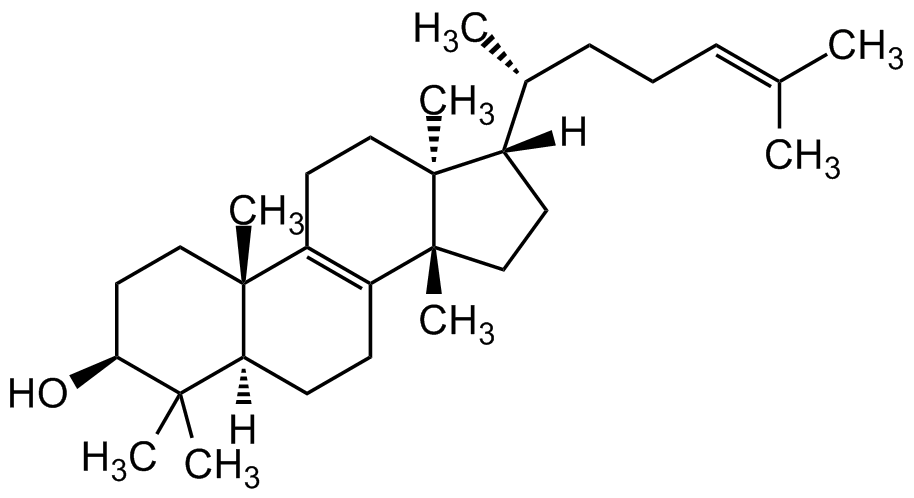
Chemical Structure
Euphol [514-47-6] [514-47-6]
AG-CN2-0541
CAS Number514-47-6
Product group Chemicals
Estimated Purity>98%
Molecular Weight426.7
Overview
- SupplierAdipoGen Life Sciences
- Product NameEuphol [514-47-6] [514-47-6]
- Delivery Days Customer10
- CAS Number514-47-6
- CertificationResearch Use Only
- Estimated Purity>98%
- Molecular FormulaC30H50O
- Molecular Weight426.7
- Scientific DescriptionChemical. CAS: 514-47-6. Formula: C30H50O. MW: 426.7. Euphol is a euphane-type triterpene alcohol that is structurally similar to cholesterol and has a wide range of pharmacological properties, including anticancer, anti-inflammatory, analgesic, antiviral and immunomodulatory effects. Euphol produces anti-inflammatory effects by mediating NF-kappaB, down-regulation of tumor necrosis factor-alpha and cyclooxygenase-2 and reduced activation of protein kinase C. Euphol inhibits the monoacylglycerol lipase (MAGL) activity via a reversible mechanism (IC50=315nM). MAGL inhibition in the periphery modulates the endocannabinoid system to block the development of inflammatory pain. Euphol exerted in vitro and in vivo cytotoxicity against several cancer cell lines and glioma cells, through several cancer pathways, including inhibition of proliferation, motility and colony formation, arresting the cell cycle, induction of apoptosis by modulation of ERK signaling and the activation of autophagy-associated cell death. Euphol, either as a single agent or in combination with conventional chemotherapy, is a potential anticancer drug. Euphol suppressed TGF-beta signaling by inducing TGF-beta receptor movement into lipid-raft microdomains and degrading TGF-beta receptors. Euphol has also shown to consistently reduce and limit the severity and development of experimental autoimmune encephalomyelitis (EAE) which is an established model of Multiple sclerosis (MS). Euphol exerts antiviral effects by inhibiting reverse transcriptase in purified human immunodeficiency virus type 1. Euphol was applied in silico as an inhibitor the of SARS-CoV-2 main protease (MPro monomer, 6m03). Euphol interacts with Phe8, Val297, Arg298 and Val303 residues of the main protease. Virulence of SARS-CoV-2 is dependend on the main protease responsible for virus replication along with many major functions. Therefore, Euphol might have potential as a COVID-19 drug. - Euphol is a euphane-type triterpene alcohol that is structurally similar to cholesterol and has a wide range of pharmacological properties, including anticancer, anti-inflammatory, analgesic, antiviral and immunomodulatory effects. Euphol produces anti-inflammatory effects by mediating NF-kappaB, down-regulation of tumor necrosis factor-alpha and cyclooxygenase-2 and reduced activation of protein kinase C. Euphol inhibits the monoacylglycerol lipase (MAGL) activity via a reversible mechanism (IC50=315nM). MAGL inhibition in the periphery modulates the endocannabinoid system to block the development of inflammatory pain. Euphol exerted in vitro and in vivo cytotoxicity against several cancer cell lines and glioma cells, through several cancer pathways, including inhibition of proliferation, motility and colony formation, arresting the cell cycle, induction of apoptosis by modulation of ERK signaling and the activation of autophagy-associated cell death. Euphol, either as a single agent or in combination with conventional chemotherapy, is a potential anticancer drug. Euphol suppressed TGF-beta signaling by inducing TGF-beta receptor movement into lipid-raft microdomains and degrading TGF-beta receptors. Euphol has also shown to consistently reduce and limit the severity and development of experimental autoimmune encephalomyelitis (EAE) which is an established model of Multiple sclerosis (MS). Euphol exerts antiviral effects by inhibiting reverse transcriptase in purified human immunodeficiency virus type 1. Euphol was applied in silico as an inhibitor the of SARS-CoV-2 main protease (MPro monomer, 6m03). Euphol interacts with Phe8, Val297, Arg298 and Val303 residues of the main protease. Virulence of SARS-CoV-2 is dependend on the main protease responsible for virus replication along with many major functions. Therefore, Euphol might have potential as a COVID-19 drug.
- SMILESC[C@H](CC/C=C(C)/C)[C@]1([H])CC[C@]([C@@]1(C)CC2)(C)C3=C2[C@]4(C)[C@](CC3)([H])C(C)(C)[C@@H](O)CC4
- Storage Instruction-20°C,2°C to 8°C
- UNSPSC12161509

![euphol [514-47-6] [514-47-6]](https://www.targetmol.com/group3/M00/37/1E/CgoaEWaySGOEQ7rAAAAAAO2LDl4167.png)